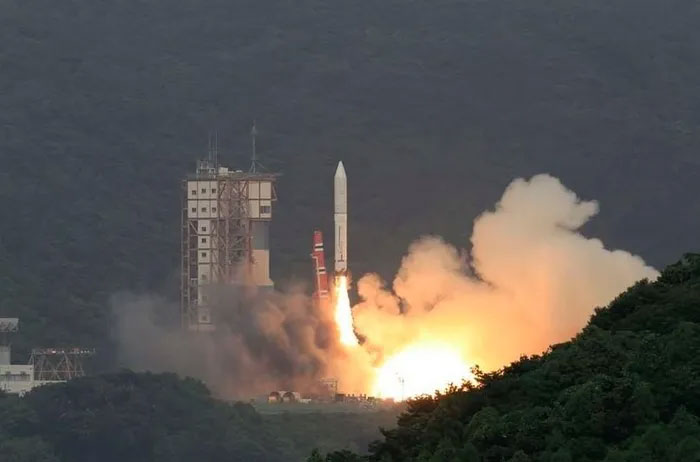Japan experiences problems during Epsilon S rocket engine test
Japan's Epsilon S rocket engine test continued to experience combustion problems , resulting in a major explosion and fire at the Tanegashima Space Center test site.
This incident once again seriously affected Japan's national space missions and satellite launch plans.

A Japanese Epsilon rocket. (Photo: Space).
The Japan Aerospace Exploration Agency (JAXA) said that at around 8:30 a.m. on November 26 (local time), an unusually serious incident occurred during a ground-based engine burn test of the second stage of the Epsilon S small solid-fuel rocket. Accordingly, shortly after the rocket's engine was started for about 120 seconds, an explosion occurred and led to a large fire at the Tanegashima Space Center test site in southwestern Japan.
To date, there has been no confirmed information about casualties following the above test incident. However, due to the failed test, JAXA has announced that it will stop testing the Epsilon S rocket engine and conduct a detailed investigation into the incident.
Epsilon S is the latest generation rocket in the Epsilon engine family , expected to replace the current Epsilon rocket system and enhance Japan's competitiveness in the growing rocket engine market. This is a rocket jointly developed by JAXA and the aerospace division of IHI Corporation. Epsilon S is scheduled to be launched into space in the current fiscal year. However, this is the second time an accident and explosion have occurred during testing of this rocket engine.
Previously on July 14, the Epsilon rocket engine also exploded about 50 seconds after the engine was started, at the Noshiro Test Center in Akita Prefecture. According to JAXA's conclusion, the cause of this explosion was due to a part of the engine's ignition device melting due to heat and being dispersed, damaging the insulation inside the fuel tank and causing an abnormal fire.
- Japan delayed the launch of the Epsilon rocket 19 hours before the scheduled time
- Japan is about to launch new generation missiles
- Japan successfully launched the new Epsilon missile
- A SpaceX rocket engine exploded during testing
- NASA tests rocket engine on the Moon
- Hundred times hotter than the core of the Sun, this country's rocket engine leaves American and Chinese rockets in the dust
- New groundbreaking rocket engine system
- Japan will make intelligent missiles
- Japan successfully launched missiles using advanced hard fuels
- The engine can help the plane reach speeds of Mach 9
- SpaceX tested new engines to bring people to Mars
- 3D-printed rocket engine generates 10 tons of thrust
 Van Allen's belt and evidence that the Apollo 11 mission to the Moon was myth
Van Allen's belt and evidence that the Apollo 11 mission to the Moon was myth The levels of civilization in the universe (Kardashev scale)
The levels of civilization in the universe (Kardashev scale) Today Mars, the sun and the Earth are aligned
Today Mars, the sun and the Earth are aligned The Amazon owner announced a secret plan to build a space base for thousands of people
The Amazon owner announced a secret plan to build a space base for thousands of people